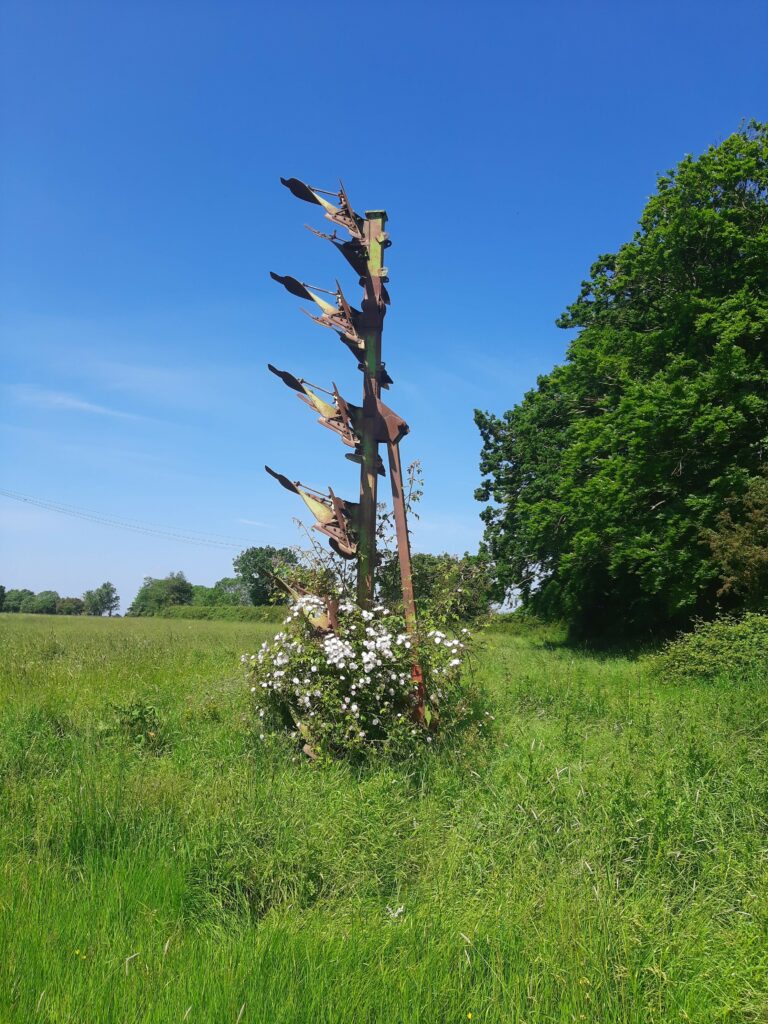I don’t want to bang on about the weather, but the farm here doesn’t look brilliant as a result of all the wet we’ve had these last few months. That and some poor management decisions in the autumn, leaving some undrilled land bare over winter and various late drilled fields succumbing to slugs and rooks and drowning. The spring crops look ok, we drilled everything with the Horsch CO4 as we have struggled to get good results with the disc drill sowing in the spring – especially when it rains incessantly on the new sown land.
We’ve got a crop of heritage Maslin (a blend of wheats and ryes) growing in the field next to the Groundswell demo area. It went in very nicely, we cross-harrowed it with an Einbock a couple of times after emergence as the deal is it is not to have any chemicals on it at all. We added some Rivendel clover on the second pass, which has made a surprisingly good effort at getting going considering the canopy that’s growing above it. There is quite a population of grass weeds lurking in the ground; we took some out but probably encouraged more and it’ll be interesting to see if the tall crop and no fertiliser makes life too hard for the weeds. We can but hope.
Meanwhile there’s a bit of preparation going on next door for Groundswell (26/27th June), and it looks like being the best yet. Some of the speakers are jetting in, including, John Kempf talking on agronomy, Derek and Tannis Axten from Canada on companion cropping, Anna K from Finland on the soil and Josef Holzer from the foothills of the Alps on permaculture. They’ll be joining the 260 odd other speakers looking at everything regenerative, from the tiniest creatures in the soil to the dysfunctional food systems that aren’t helping anyone beyond a handful of multinational companies. As always though, it’ll mainly be about what we as farmers can do to make our businesses more resilient. There are also more safaris, heading off to look at anything from beetles to ponds and agroforestry, through truffles to hedge life.

We have started a demonstration seven year rotation on site to show how, for instance, no-till potatoes can be incorporated into an arable system, the key question being how do you cope with all that straw that is left after the potatoes are harvested. As this is in its first year, we don’t have last year’s potato-covering straw on site, but we have planted sweetcorn, beans and pumpkins with George Sly’s marvellous purpose-built Horizon drill, even if the row-cleaners weren’t actually necessary this time. The plan is to clear a strip every 50cm or so and grow the crops in there and leave the straw in between as mulch and a mat to keep pumpkins/ gourds etc off the ground. By the end of year two, the straw should be rotted to a lovely surface compost dressing.
It’s been an extraordinary journey, hosting Groundswell that is, these last eight years. It feels as if we’ve been constantly surfing the groundswell of ideas that have risen up from this wonderful, farmer-led revolution. We didn’t expect regenerative agriculture to become so fertile and to spread into the realms of food and community; Jill Clapperton advised us after the first show in 2016 that we might be best off only attempting to put an event on every other year, as there wouldn’t be enough speakers to fill an annual schedule!
There is a growing understanding about how the quality of the food we produce affects the health and wellbeing of those that consume it. As farmers, we can be quite isolated on our own piece of ground and so it is a real pleasure and a tonic to focus on the wider issues and to come together with a bunch of like-minded enthusiasts.

It seems a shame to restrict all this to two days a year, so we’ve been working on Groundswell Outreach, to look at other ways of keeping the message expanding. One way is helping get other events up and running, like the fabulous GO Falkland in Fife, Scotland https://falklandestate.co.uk/go-falkland/ (17th/18th July 2024). They’ve got a brilliant line-up of talks aimed squarely at a Scottish audience this year and I recommend everyone North of the border to make a bee-line there.
Another project is Groundschool, on which we are collaborating with Writtle University to offer hands-on experience and teaching. This will be available not only to students, but also farmers, gardeners, cooks, business people, policy makers and anyone else who might be interested, like Uncle Tom Cobley.
This is all very much a work in progress and we have no idea quite how it will turn out, but we’d be delighted to talk to anyone who fancies getting involved. The first project which is underway is a small market garden which should soon be providing vegetables for the local community. This is all happening at the other side of the village to the Groundswell site.


